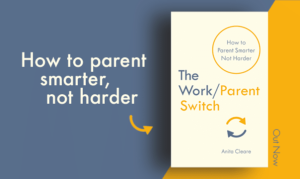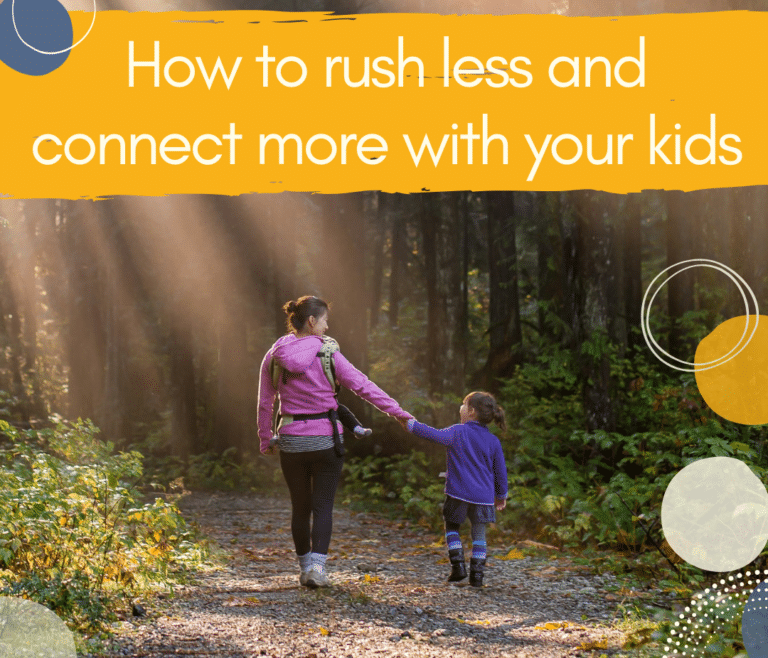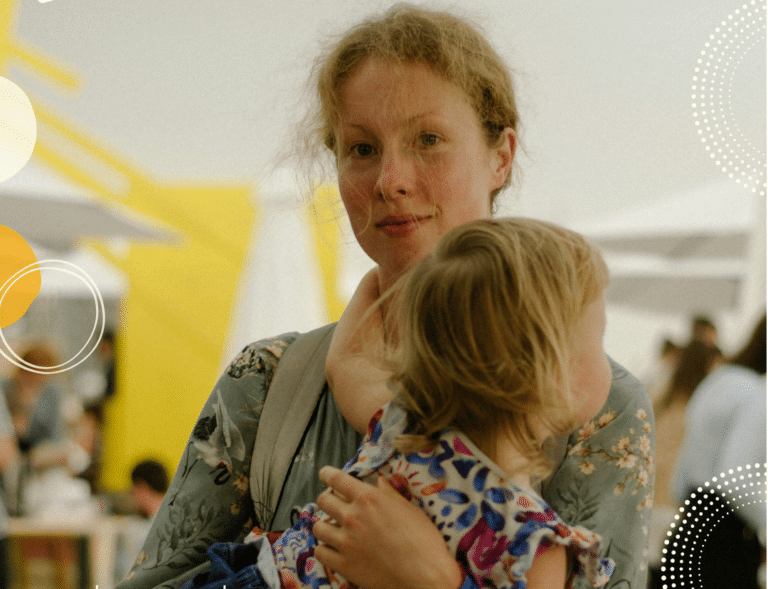How to rush less and connect more with your kids
Do you find it hard to slow down and just be with your kids? Is your mind whirling with that unfinished To Do list even as you are trying to play or listen or connect with your kids? Do you leap on every moment to achieve a parenting goal – to land a message, teach a lesson, remind or reprimand – and worry about the impact on your kids?
If that sounds familiar, you are not alone. Modern parents have been set an impossible task. We are working more hours than ever. The demands of life admin are ever-increasing. And yet, at the same time, the job description of what counts as being a ‘good parent’ has expanded exponentially.
We are trying really hard – yet many of us feel we are (at best) just running to stand still or (at worse) simply failing.
Perhaps a bit of slow parenting might be a helpful reset? But how to go about that when you are permanently rushing and still not getting everything done? Here are my top tips for busy working parents on how to rush less, enjoy family time and connect more with your kids every day.
Reframe parenting as relationship building
I talk a lot in my webinars for working parents about how important it is to be aware of how you think about parenting. How we define or conceptualise parenting leads us to act in certain ways. If, for example, we think “My job as a parent is to make sure my children grow up happy and successful,” then we are more likely to gear our parenting actions towards ensuring that children do well at school or taking a hands-on approach to managing their friendships.
Now, I’m not saying those actions are wrong. But if you were to redefine parenting as an act of relationship building – “My job is to build a relationship with my child so I understand what’s going on for them and am able to guide and support them no matter what life has in store,” – I wonder if that might lead you towards different parenting actions? Could that help you do less, rush less and slow down to connect more with your kids?
Manage your mindset
Rushing is a frame of mind. It’s a pattern of thought that is driven by wanting to get things done (and having a lot to do!). In my book The Work/Parent Switch, I describe this as a mindset fuelled by “efficiency thinking” or “To Do list” thinking – which is great for work and for getting things done around the house. The problem is that efficiency thinking is a mindset we can easily get stuck in. Before we know it, we are so focused on getting through that long list of things that needs doing that we find ourselves frogmarching our children through the evening and never slowing down to connect or enjoy them.
If you want to rush less and connect more with your kids, you need to find ways to dial down that efficiency mindset and switch into a slower, more playful and more curious parent-mode. There are different ways to make this switch. Some parents find that breathing or mindfulness help, or just taking a moment to close your eyes and think about your kids before you walk through the door to greet them.
Have realistic expectations
Children don’t tend to do things in a hurry (especially when you are rushing to get somewhere!). That’s not because they are being deliberately awkward but simply because their brains don’t work that way. Children don’t do efficiency thinking. Their minds are fuelled by curiosity and play and attending to whatever is going on in the present rather than marching through time with both eyes fixed on the future.
So, you might as well accept that. Leave lots of time for transitions and for getting ready and getting places. Expect that the kids will take longer than you think is needed and will have sudden whims or changes of mind. When we have realistic expectations, we set our children (and ourselves) up to succeed. And when you have built in extra time, it’s much easier to rush less and connect more along the way.
Build in down moments
Why not get your routine to help you here? Make it a tradition when you pick up your child from Nursery to walk around the pond and look at the ducks. Sit on a bench to eat that after school snack when you do the school pick-up. Spend Friday evenings eating snacks under a duvet on the sofa cuddled up watching a film. Go for Sunday afternoon walks in which you are not trying to get anywhere by any time. Maybe lie on the grass and look at the clouds (then turn over and look at the insects). Create rituals and traditions which build down time into your routine so connection and slowness has regular space to flourish.
Don’t jump on every chance to parent
Sometimes less really is more. Don’t add to your To Do list by over-parenting. Don’t be the Fix It parent who rushes to smooth every inconvenience or project manage all discomfort away. Children need the chance to rise to challenges and cope with difficult moments in order to build their self-esteem and develop resilience. Yes, you could use this precious moment (and take up precious space in your brain) reminding your child to practise their clarinet. Or you could hand over that responsibility to them and allow them the opportunity to learn through experience and develop their own organisational skills. Could you let go and let life do some of the heavy lifting for you?
Take some time out
You are more than a parent. You deserve rest and joy. When you grant yourself the grace of treating yourself kindly, nurturing yourself and meeting your own needs, you might find that the need to rush diminishes a little and your desire to enjoy your family can flourish. And you might find it easier to adjust the performance metrics you set yourself as a parent away from getting it all done and towards connection and relationship.
Good luck (and do let me know how you get on) x
Got a teen or pre-teen? Head to my new book How to Get Your Teenager Out of Their Bedroom for ideas on how to connect with teens!









Leave a Reply